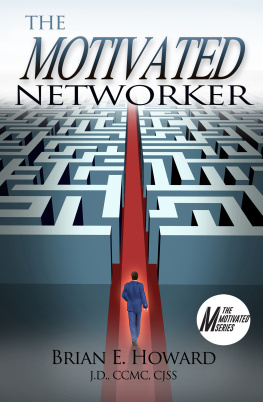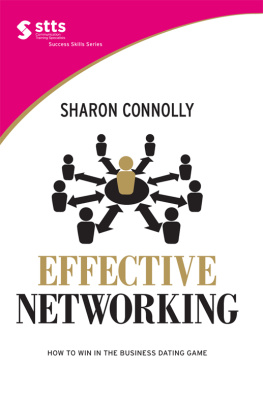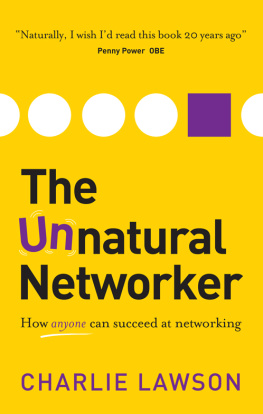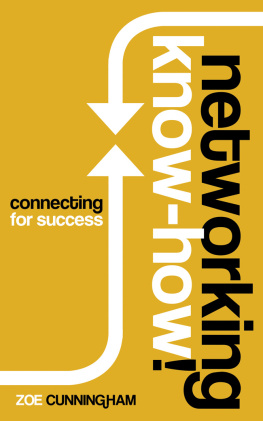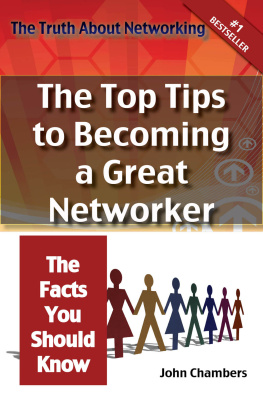
The Motivated Networker
2016 Brian Howard. All rights reserved.
No part of this book may be reproduced in any form or by any means, electronic, mechanical, digital, photocopying, or recording, except for the inclusion in a review, without permission in writing from the publisher.
The external links are being provided as a convenience and for informational purposes only; they do not constitute an endorsement or an approval by WriteLife Publishing of any of the products, services or opinions of the corporation or organization or individual. WriteLife Publishing bears no responsibility for the accuracy, legality, or content of the external site or for that of subsequent links. Contact the external site for answers to questions regarding its content.
Published in the United States by WriteLife Publishing, Inc.
www.writelife.com
978-1-60808-158-5 (p)
978-1-60808-159-2 (e)
Library of Congress Control Number: 2016942431
Book design by Robin Krauss, www.bookformatters.com
Cover design by Ellis Dixon, ellisdixon.com
Other Books in The Motivated Series
The Motivated Job Search
Over 50 and Motivated
The Motivated Job Search Workbook
Motivated Resumes
To my parents, Gene and Phyllis Howard, who instilled in me at a young age the value of a strong work ethic, perseverance, and a desire to achieve.
To my father, who intuitively knew how to professionally and successfully network before the term networking was coined. He followed the golden rule of networkingtreat others as you would want to be treated.
Message from the Author
The importance of a professional network in todays job market cannot be overstated. Having relationships and being connected to other professionally relevant people is arguably one of the most valuable assets you have for a job search. These relationships and people will support you emotionally in your job search, advise you, connect and direct you, and help you tap into the Hidden Job Market. They can lead you to your next job!
Over the course of my career as an executive recruiter, I have seen well-qualified individuals struggle when it comes to professionally networking for a job. Some allow their pride to get in the way, others dont want to come across as pushy or needy, while others are simply unorganized in what they are doing. They have the best of intentions, but all too often their efforts fail to meet their job search expectations.
I wrote this book to put focus on and form to a job seekers networking efforts. Motivation and effort are important, but effective networking is more than just getting out there. It must be approached with understanding, a strategic plan, and true knowledge of what it means to engage in professional networking.
A robust network and refined networking skills will serve you well in a job search and throughout your entire professional life. The positive effects on your job search and your career from nurturing professional relationships are astounding!
This book is the culmination of a careers worth of advice, frontline experience, and research on the topic of professional networking during a job search. It is written for you as a helping hand so you can more effectively use the most valuable tool you have in your job searchyour professional network!
Brian E. Howard
The Twelve Most Important Principles and Tools for Successful Job Search Networking
1. Embrace a networking mentalityConcentrate on building relationships for the long term. Be sincere. Be helpful. Be present in the moment. Listen and learn.
2. Prepare an elevator speechFocus on an accomplishment(s) to create differentiation.
3. Create the appropriate business cardEmphasize key accomplishments and branding.
4. Identify high value professionals who can help you or hire youThese are professionals who can move your job search forward.
5. Connect with high value professionalsReach out to these professionals using various means, including LinkedIn, email, calls, and so on.
6. Engage with high value professionalsWhen communicating, focus on the conversation, be interested, listen, and learn.
7. Prepare and planDo your research on people and their companies before a networking opportunity. Plan, prioritize, and strategize for the best use of your time.
8. Always offer to helpThis goes straight to the heart of professional networking. Offer to help others and they will try to return the favor. Give to receive.
9. Always follow up and follow throughFollow up after every networking engagement and especially follow through on any action items you promised.
10. Stay in touchDo not be a hit-and-run networker. Have the appropriate level of communication consistent with the level of the relationship (current or desired). Drip market yourself at appropriate frequency.
11. Evaluate and improveOccasionally reflect upon all facets of your networking efforts. Look for areas that need improvement.
12. Have a complete LinkedIn profileThis allows your networking contacts to get a complete picture of who you are. Your profile must align exactly with your elevator speech, resume, business card, or any other messaging.
All of these topics and more are thoroughly discussed in the pages that follow.
Table of Contents

Dont bunt. Aim out of the ballpark. Aim for the company of immortals. David Ogilvy
This networking book is written for career-minded professionals who want to leverage their professional network and improve their networking skills to enhance their job search.
The approach is simple: Each topic is designed to tell you what you need to know and what you need to do to successfully use networking to get a job. Every effort was taken to write this book in straightforward language, assuming that the reader already has a basic understanding of networking and hiring practices in the business world.
Its beneficial to talk briefly about the psychology of persuasion and how it will affect your networking conversations (and your overall job search).
What follows are some very important concepts that can benefit you in your networking efforts. Knowing them will help you maximize your success.
According to Robert Cialdini, a leader in the field of psychology and persuasion, there are six principles that persuade others to think and act as they do. They are:
1. Scarcity
2. Authority
3. Liking
4. Social Proof
5. Consistency and Commitment
6. Reciprocity/Reciprocation
We will briefly discuss these principles and how they relate to your networking.
Scarcity
If a job seeker is viewed to be unique, special, or scarce, he or she is seen as valuable. How do you capitalize upon the persuasion principle of scarcity? Answer: Differentiation.
Creating differentiation (separation) between you and other job seekers is important when you network. During the course of conversations and communications, seemingly small and isolated thoughts of differentiationsuch as he/she dresses well, is knowledgeable on industry trends, has a professional designation, and so oncompound upon themselves in the minds of those you interact with. All of this affects your perceived value and motivates people to continue the engagement with you. The more uniquely you can justifiably portray yourself while networking, the more you are using the persuasion principle of scarcity.
Next page
